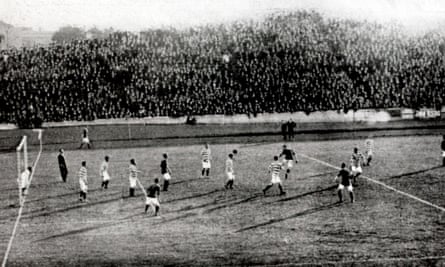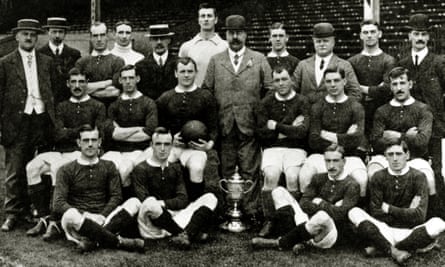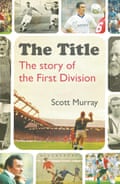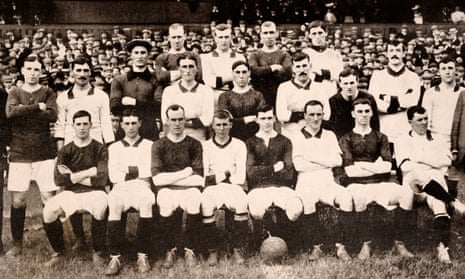Something had been stirring in Manchester. City had come to prominence in the 1903-04 season, finishing runners-up to The Wednesday while scoring 23 more goals than the champions. Their star player was toothpick-chewing Billy Meredith, a winger of outrageous skill and rapidly increasing fame. He scored the winning goal in that season’s FA Cup final, selling Bolton Wanderers keeper Dai Davies an outrageous dummy, shaping to cross only to batter a surprise shot into the top corner from a tight angle.
“You will forgive my natural partiality and excuse me for expressing my satisfaction at Manchester’s success,” simpered the guest of honour Arthur Balfour, the prime minister and member for the Manchester East constituency, in a post-match speech, before adding with uncharacteristic self-deprecation: “I can only speak to you as an admiring ignoramus … what a gallant fight has been fought!”
A rather less honourable throwing of hands occurred at the end of the following season. City were involved in the 1904–05 title race that eventually ended with Newcastle United pipping Everton by a point. In with a shout on the final day, they needed to win at Aston Villa to have any sort of chance. Meredith was, for once, a complete bystander as City went down 3-2.
As a result they finished the season third, though another near miss proved to be the least of their worries. The match had ended in robust fashion: Villa’s captain, Alec Leake, threw mud at City’s Sandy Turnbull, who reacted by waving a stiff two fingers in his opponent’s face. The two ended up trading blows and were fortunate not to be sent off.
Afterwards, still fuming, Leake claimed that Meredith had offered him a £10 bribe to throw the match. Meredith denied the accusation but was banned for a year anyway. He then received an additional suspension for asking City to pay him during his ban. The FA, its interest in City’s financial affairs piqued, found the club were offering players a host of illegal inducements.

At the end of the 1905-06 season, 17 players – nearly the entire first-team squad – were suspended and fined, while the manager, Tom Maley, received a sine die ban. City were forced to put up their squad for auction at the Queen’s Hotel that November.
While City were unravelling, another force was rising across town. Newton Heath joined the new First Division when the Football League and Alliance League merged in 1892-93. They finished bottom in their first campaign but retained their status on winning a Test Match against Small Heath, only to finish bottom again in 1893-94.
This time they lost the Test against upwardly mobile Liverpool and became only the second club, after Darwen, to suffer relegation. Newton Heath found it impossible to bounce back and by 1901 were in dire financial straits. In a fit of desperation they decided to stage a fundraising bazaar. The result initially appeared farcical: when the cost of hiring a hall was factored in, barely a bronze centime of profit had been turned.
But there is more than one way to skin a cat. The club captain, Harry Stafford, had brought his St Bernard dog, Major, along to the bazaar, strapping a collection tin around its neck and letting it mooch around in search of coins. Predictably enough poor Major got lost and was eventually found by a friend of the local brewing magnate John Davies. His daughter having fallen in love with Major, Davies went off in search of the owner with a view to purchasing the mutt.

Sweet serendipity: Davies and Stafford got talking about Newton Heath, sewing a seed in the brewer’s mind, and when the club was threatened with a winding-up order a year later, Davies and three friends stumped up the cash to save the club. A rebrand was mooted. According to the Manchester Evening News, “one old supporter suggested that the name of the club should be changed to Manchester United, but this did not meet with much favour”.
However, after Manchester Celtic and Manchester Central were given short shrift, and with nobody able to come up with anything better, the United suggestion was rubber-stamped in true that’ll-do fashion. Major was given a treat for being a good boy.
In 1903 the all-new Manchester United gave their manager’s job to Ernest Mangnall, a smooth operator who had kept nearby Burnley afloat during some difficult times. The dapper Mangnall – all clipped moustache and straw boater – set about hauling the club out of the Second Division. His game-changing purchase was Charlie Roberts. An incongruous sight in 1980s-style, thigh-high shorts – the authorities tried to force him into contemporaneous knee-covering breeches, to no avail – Roberts was similarly ahead of the game as a ball-playing defender. As captain he calmly guided United to promotion in 1905-06.
United won their first match in the top flight since the days of Newton Heath, beating a Bristol City side also freshly promoted and destined to finish second behind Newcastle.
Manchester City, however, did not start the 1906-07 season quite so impressively. In effect a team of recruits in the wake of their close-season punishment, they went down 4-1 at home to Woolwich Arsenal.

The result can partly be put down to the extraordinary heatwave burning up the country: the Manchester Guardian rather over-excitedly claimed that the thermometer was at “120 degrees Fahrenheit”, though it was certainly over 90. City, parched and frazzled, ended the game with just six players left standing, having endured “toils which would have meant death to ordinary men”. But even the partisan local paper could only stretch the point so far. “It was clear that City were in poor condition for a professional football side.”
City followed that horror show two days later by crashing 9-1 at Everton. “The City players were thought to have recovered from Saturday’s prostration,” reported the Manchester Guardian, “but the result of the play showed the effects still remained.”
The result remains Everton’s biggest victory in League history, the weather gods giving them a little something back for the fog-bound farce that cost them the 1904–05 title.
City eventually regrouped and ended the season comfortably clear of the relegation places, though there were still two other huge blows to suffer during that campaign.
Billy Meredith, still suspended, crossed town to join United in October 1906. Then a month later Ernest Mangnall insouciantly sashayed through the foyer of the Queen’s Hotel, past other club managers waiting patiently and politely for the official start of the City player auction, and brazenly struck agreements to sign forward Sandy Turnbull, defender Herbert Burgess and winger Jimmy Bannister, before swanning back out into the bracing Mancunian evening.
Meredith, Turnbull, Bannister and Burgess all made their debuts on New Year’s Day 1907, returning to football after their suspensions. United’s Bank Street ground crackled with anticipation.
Aston Villa were beaten 1-0, Meredith dribbling at pace down the right before fizzing in a low cross for Turnbull to convert. Before Mangnall’s machinations, relegation straight back to the Second had been a very real possibility, but United went on to win 10 of their last 15 games, ending their first season back in the top flight in a comfortable top-half position.
The statement of intent rang loud and clear. Mangnall’s side flew out of the blocks in 1907-08. Before October was out, they had put four past Aston Villa, Liverpool, Chelsea and Nottingham Forest, five past Blackburn Rovers and six past the reigning champions, Newcastle United, on their own turf. A wobble after the New Year culminated in a surreal 7-4 defeat at Liverpool but United responded with a 4-1 win over The Wednesday and eventually sauntered to their first title, nine clear of Aston Villa and a resurgent Manchester City – a briefly resurgent Manchester City.
The Title: The Story of the First Division by Scott Murray (Bloomsbury, £16.99) was released on 7 September. To order a copy for £13.59, go to guardianbookshop.com or call 0330 333 6846. Free UK p&p over £10, online orders only. Phone orders min. p&p of £1.99.
